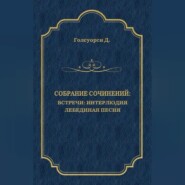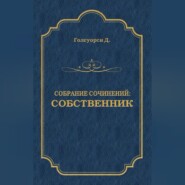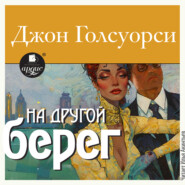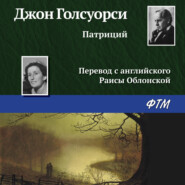По всем вопросам обращайтесь на: info@litportal.ru
(©) 2003-2024.
✖
The Forsyte Saga, Volume III. Awakening. To Let
Настройки чтения
Размер шрифта
Высота строк
Поля
“I’ll buy her of you at the price you gave,” said Val with sudden resolution.
“No,” said Monsieur Profond. “You take her. I don’ want her.”
“Hang it! one doesn’t – ”
“Why not?” smiled Monsieur Profond. “I’m a friend of your family.”
“Seven hundred and fifty guineas is not a box of cigars,” said Val impatiently.
“All right; you keep her for me till I want her, and do what you like with her.”
“So long as she’s yours,” said Val. “I don’t mind that.”
“That’s all right,” murmured Monsieur Profond, and moved away.
Val watched; he might be “a good devil,” but then again he might not. He saw him rejoin George Forsyte, and thereafter saw him no more.
He spent those nights after racing at his mother’s house in Green Street.
Winifred Dartie at sixty-two was marvellously preserved, considering the three-and-thirty years during which she had put up with Montague Dartie, till almost happily released by a French staircase. It was to her a vehement satisfaction to have her favourite son back from South Africa after all this time, to feel him so little changed, and to have taken a fancy to his wife. Winifred, who in the late seventies, before her marriage, had been in the vanguard of freedom, pleasure, and fashion, confessed her youth outclassed by the donzellas of the day. They seemed, for instance, to regard marriage as an incident, and Winifred sometimes regretted that she had not done the same; a second, third, fourth incident might have secured her a partner of less dazzling inebriety; though, after all, he had left her Val, Imogen, Maud, Benedict (almost a colonel and unharmed by the War) – none of whom had been divorced as yet. The steadiness of her children often amazed one who remembered their father; but, as she was fond of believing, they were really all Forsytes, favouring herself, with the exception, perhaps, of Imogen. Her brother’s “little girl” Fleur frankly puzzled Winifred. The child was as restless as any of these modern young women – “She’s a small flame in a draught,” Prosper Profond had said one day after dinner – but she did not flap, or talk at the top of her voice. The steady Forsyteism in Winifred’s own character instinctively resented the feeling in the air, the modern girl’s habits and her motto: “All’s much of a muchness! Spend, to-morrow we shall be poor!” She found it a saving grace in Fleur that, having set her heart on a thing, she had no change of heart until she got it – though – what happened after, Fleur was, of course, too young to have made evident. The child was a “very pretty little thing,” too, and quite a credit to take about, with her mother’s French taste and gift for wearing clothes; everybody turned to look at Fleur – great consideration to Winifred, a lover of the style and distinction which had so cruelly deceived her in the case of Montague Dartie.
In discussing her with Val, at breakfast on Saturday morning, Winifred dwelt on the family skeleton.
“That little affair of your father-in-law and your Aunt Irene, Val – it’s old as the hills, of course, Fleur need know nothing about it – making a fuss. Your Uncle Soames is very particular about that. So you’ll be careful.”
“Yes! But it’s dashed awkward – Holly’s young half-brother is coming to live with us while he learns farming. He’s there already.”
“Oh!” said Winifred. “That is a gaff! What is he like?”
“Only saw him once – at Robin Hill, when we were home in 1909; he was naked and painted blue and yellow in stripes – a jolly little chap.”
Winifred thought that “rather nice,” and added comfortably: “Well, Holly’s sensible; she’ll know how to deal with it. I shan’t tell your uncle. It’ll only bother him. It’s a great comfort to have you back, my dear boy, now that I’m getting on.”
“Getting on! Why! you’re as young as ever. That chap Profond, Mother, is he all right?”
“Prosper Profond! Oh! the most amusing man I know.”
Val grunted, and recounted the story of the Mayfly filly.
“That’s so like him,” murmured Winifred. “He does all sorts of things.”
“Well,” said Val shrewdly, “our family haven’t been too lucky with that kind of cattle; they’re too light-hearted for us.”
It was true, and Winifred’s blue study lasted a full minute before she answered:
“Oh! well! He’s a foreigner, Val; one must make allowances.”
“All right, I’ll use his filly and make it up to him, somehow.”
And soon after he gave her his blessing, received a kiss, and left her for his bookmaker’s, the Iseeum Club, and Victoria station.
VI. – JON
Mrs. Val Dartie, after twenty years of South Africa, had fallen deeply in love, fortunately with something of her own, for the object of her passion was the prospect in front of her windows, the cool clear light on the green Downs. It was England again, at last! England more beautiful than she had dreamed. Chance had, in fact, guided the Val Darties to a spot where the South Downs had real charm when the sun shone. Holly had enough of her father’s eye to apprehend the rare quality of their outlines and chalky radiance; to go up there by the ravine-like lane and wander along toward Chanctonbury or Amberley, was still a delight which she hardly attempted to share with Val, whose admiration of Nature was confused by a Forsyte’s instinct for getting something out of it, such as the condition of the turf for his horses’ exercise.
Driving the Ford home with a certain humouring, smoothness, she promised herself that the first use she would make of Jon would be to take him up there, and show him “the view” under this May-day sky.
She was looking forward to her young half-brother with a motherliness not exhausted by Val. A three-day visit to Robin Hill, soon after their arrival home, had yielded no sight of him – he was still at school; so that her recollection, like Val’s, was of a little sunny-haired boy, striped blue and yellow, down by the pond.
Those three days at Robin Hill had been exciting, sad, embarrassing. Memories of her dead brother, memories of Val’s courtship; the ageing of her father, not seen for twenty years, something funereal in his ironic gentleness which did not escape one who had much subtle instinct; above all, the presence of her stepmother, whom she could still vaguely remember as the “lady in grey” of days when she was little and grandfather alive and Mademoiselle Beauce so cross because that intruder gave her music lessons – all these confused and tantalised a spirit which had longed to find Robin Hill untroubled. But Holly was adept at keeping things to herself, and all had seemed to go quite well.
Her father had kissed her when she left him, with lips which she was sure had trembled.
“Well, my dear,” he said, “the War hasn’t changed Robin Hill, has it? If only you could have brought Jolly back with you! I say, can you stand this spiritualistic racket? When the oak-tree dies, it dies, I’m afraid.”
From the warmth of her embrace he probably divined that he had let the cat out of the bag, for he rode off at once on irony.
“Spiritualism – queer word, when the more they manifest the more they prove that they’ve got hold of matter.”
“How?” said Holly.
“Why! Look at their photographs of auric presences. You must have something material for light and shade to fall on before you can take a photograph. No, it’ll end in our calling all matter spirit, or all spirit matter – I don’t know which.”
“But don’t you believe in survival, Dad?”
Jolyon had looked at her, and the sad whimsicality of his face impressed her deeply.
“Well, my dear, I should like to get something out of death. I’ve been looking into it a bit. But for the life of me I can’t find anything that telepathy, sub-consciousness, and emanation from the storehouse of this world can’t account for just as well. Wish I could! Wishes father thought but they don’t breed evidence.” Holly had pressed her lips again to his forehead with the feeling that it confirmed his theory that all matter was becoming spirit – his brow felt, somehow, so insubstantial.
But the most poignant memory of that little visit had been watching, unobserved, her stepmother reading to herself a letter from Jon. It was – she decided – the prettiest sight she had ever seen. Irene, lost as it were in the letter of her boy, stood at a window where the light fell on her face and her fine grey hair; her lips were moving, smiling, her dark eyes laughing, dancing, and the hand which did not hold the letter was pressed against her breast. Holly withdrew as from a vision of perfect love, convinced that Jon must be nice.
When she saw him coming out of the station with a kit-bag in either hand, she was confirmed in her predisposition. He was a little like Jolly, that long-lost idol of her childhood, but eager-looking and less formal, with deeper eyes and brighter-coloured hair, for he wore no hat; altogether a very interesting “little” brother!
His tentative politeness charmed one who was accustomed to assurance in the youthful manner; he was disturbed because she was to drive him home, instead of his driving her. Shouldn’t he have a shot? They hadn’t a car at Robin Hill since the War, of course, and he had only driven once, and landed up a bank, so she oughtn’t to mind his trying. His laugh, soft and infectious, was very attractive, though that word, she had heard, was now quite old-fashioned. When they reached the house he pulled out a crumpled letter which she read while he was washing – a quite short letter, which must have cost her father many a pang to write.
“MY DEAR,
“You and Val will not forget, I trust, that Jon knows nothing of family history. His mother and I think he is too young at present. The boy is very dear, and the apple of her eye. Verbum sapientibus,
“Your loving father,
“J. F.”
That was all; but it renewed in Holly an uneasy regret that Fleur was coming.
After tea she fulfilled that promise to herself and took Jon up the hill. They had a long talk, sitting above an old chalk-pit grown over with brambles and goosepenny. Milkwort and liverwort starred the green slope, the larks sang, and thrushes in the brake, and now and then a gull flighting inland would wheel very white against the paling sky, where the vague moon was coming up. Delicious fragrance came to them, as if little invisible creatures were running and treading scent out of the blades of grass.
Jon, who had fallen silent, said rather suddenly:

















